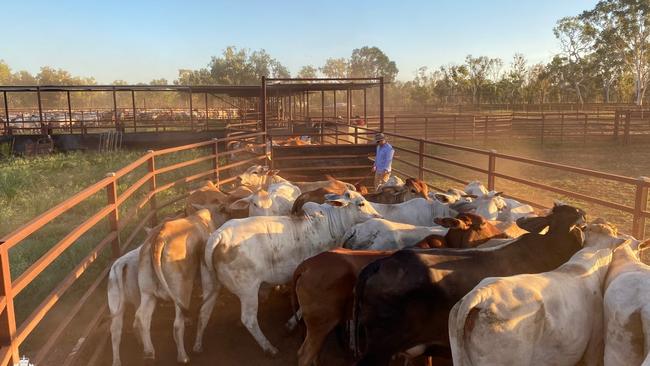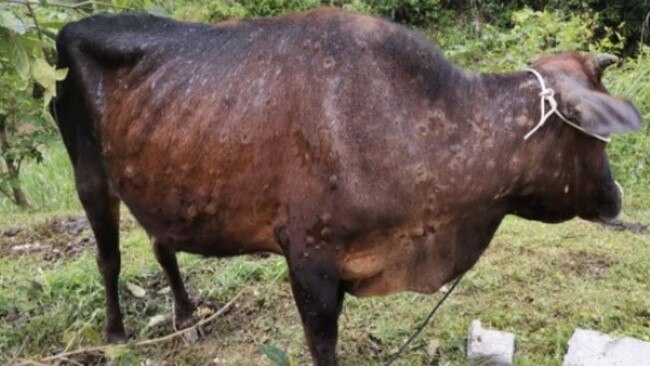‘All clear’: Chief NT vet speaks out amid lumpy skin live cattle suspension
The NT’s chief vet has described how an outbreak of lumpy skin disease in the NT would impact the industry. But he’s ‘confident’ the worst will not happen.
Business
Don't miss out on the headlines from Business. Followed categories will be added to My News.
Chief Northern Territory vet Rob Williams said there was considerable evidence accumulated over a number of years that the local cattle herd is free of lumpy skin disease.
Dr Williams said Australian biosecurity officials were alert to the threat posed by lumpy skin disease long before the virus arrived in Indonesia last year.
First identified in Africa in the 1920s, the virus surged from about 2009 through the Middle East, Europe, Asia and South-East Asia and was first detected in Indonesia in March 2022.
Dr Williams said lumpy skin outbreaks were disastrous to affected cattle and the virus has never been eradicated when it enters a jurisdiction.

“It really knocks cattle around,” he said.
“It has a low mortality rate but high morbidity and you lose months and months of production. When you’re running lean and efficient systems, it will devastate herds.”
Industry figures agree the threat posed to the Territory’s 1.7m head cattle herd and Northern Australia’s cattle industry generally is enormous, as the suspension of live exports by Indonesia from four northern Australian cattle yards has highlighted.
Dr Williams said NT and commonwealth biosecurity officers had stepped up local testing but that lumpy skin disease and other biosecurity testing constantly takes place in the Territory and Northern Australia.

“We’re testing to confirm we’re lumpy skin disease free,” he told this publication.
“We’ve got quite an extensive network of private vets we use and we’re always testing across the north of Australia. Between us, Queensland and Western Australia we’re looking at all diseases that are exotic to Australia.
“There’s a few more tests we have to do but this is just normal for us. We’re confident we’re free and Australia’s free of lumpy skin disease.
He said blood and skin samples were being sent to Northern Australia’s “jewel in the crown”, the Berrimah vet laboratory for testing, as well as the CSIRO’s Australian Centre of Disease Preparedness in Geelong.
“That’s a normal protocol we follow but in this case there’s more samples involved than we would normally send off,” he said.
Next steps for Territory’s live export cattle ban revealed
Blood and skin samples from two NT cattle yards subject to an Indonesian live export ban have been sent interstate for testing.
Indonesia on Friday suspended cattle from four northern Australian farms after it said 13 head tested positive for lumpy skin disease.
Samples from the two Territory farms affected have been sent to the CSIRO’s Australian Centre of Disease Preparedness in Geelong, with results expected back within days.
Australian biosecurity authorities are confident the country remains lumpy skin disease-free despite Indonesia’s claims the 13 animals contracted the virus in Australia.
If the comprehensive testing program finds no lumpy skin disease in the local herd, it’s expected Indonesian officials are likely to request further testing of herds in Western Australia, Queensland and the Northern Territory to ensure Australia remains free of the disease.
The Federal Department of Agriculture, Fisheries and Forestry has not updated Sunday’s advice that Australia remains LSD free.
A spokesman told this publication the department was aware of testing being done on the affected properties.
The cattle industry, Territory, state and federal agricultural officials are treating Indonesia’s claims extremely seriously and have no idea when the ban on the four farms will be lifted.
Territory Agribusiness Minister Paul Kirby said the timeline of the ban was unclear.
“What we can guarantee is that the cattle left here without the disease, that we’ve got good protocols and good testing regimes,” he said.
“We haven’t had any incidents of lumpy skin disease on the mainland here in Australia, and that remains the case.
“We’re doing a range of testing that started this week through our department up and down out of these export facilities to make sure that’s still the case and to assure the Indonesian government we don’t have lumpy skin disease here in Australia.
“We’re working really closely with the Indonesian government to make sure they can do the range of testing they need to do to make sure the cattle are safe when they arrive and there’ll be a range of testing that continues through the week.”
An NT government official told this publication cattle vaccinated against lumpy skin disease can test positive for the virus and there was a possibility of false test results.
Two Territory cattle yards on export ban list
Indonesia has banned live cattle exports from four Australian holding yards including two Top End facilities after lumpy skin disease was detected.
But Australia remains LSD-free, despite the positive test results in 13 head of cattle sent to Indonesia in recent weeks, but that had been in the Asian country for a period of time.
Government and industry figures have been quick to defend biosecurity practices in the NT and Australian cattle industry as Indonesia bans exports of cattle from four holding yards across Australia: two in the Territory, and one each in WA and Queensland.
They are also preparing to undertake extensive testing at northern Australian sites to prove to Indonesia all our cattle are free of the lumpy skin disease.

An email sent to Territory farmers on Sunday by NT Cattlemen’s Association chief executive Will Evans said the Indonesian LSD outbreak was not caused by Australian cattle.
“As Australia is LSD free, a detection of LSD in Australian cattle situated in another country does not affect Australia’s LSD free status,” Mr Evans said
He said despite close collaboration between the Australian and Indonesian governments, Indonesia had suspended cattle from the four yards, but that the live cattle trade between the two countries remains open.
“The effect of these suspensions will be that the affected yards will not be able to export to Indonesia until this suspension is lifted,” Mr Evans said.
“These yards will still be able to export to other markets for which they have accreditation, and other yards in the Territory will be able to continue to supply Indonesia.”

More than 100 animals in NT cattle yards that fitted the criteria for precautionary testing such as displaying skin lesions from fly bites have been carried out with none detecting LSD.
Other reasons the NT cattle could have tested positive was a false test outcome or remnant traces from vaccination.
Territory Agribusiness Minister Paul Kirby said the federal and Territory governments were taking the suspension “extremely seriously”, including a national phone hook-up between about 80 government, biosecurity and cattle industry stakeholders.
“We know how important the live cattle export is to the north of Australia in particular, and certainly to the Northern Territory,” he said.

“Indonesia aren’t necessarily blaming anybody, what they’re doing is being very prudent and acknowledging they have found disease in animals that have come from a spread of locations across the Top End of Australia.”
Federal Agricultural Minister Murray Watt was also at pains to assure Indonesia of our lumpy skin disease-free status.
“We have never had a positive detection on our shores,” he said in a statement.
“Australian officials are working with Indonesian authorities to reassure them that all animals exported from Australia comply with all Indonesian requirements.”

Australia’s chief medical officer Dr Mark Schipp said the presence of LSD in cattle exported to Indonesia was not unexpected because the disease was present in that country.
“As Australia remains LSD free, a detection of LSD in another country — such as Indonesia — does not change Australia’s animal health status,” Dr Schipp said.
“There is no cause for concern for Australian cattle producers as Australia remains LSD free.”
The Department of Industry Technology and Trade was given an additional $2m a year in the May NT budget for frontline staff. The NT’s chief vet Dr Rob Williams said most cattle movements remained unrestricted.
“There are no restrictions on cattle movements in the NT and cattle can move according to normal requirements, including live export to Indonesia, through registered establishments” Dr Williams said.





